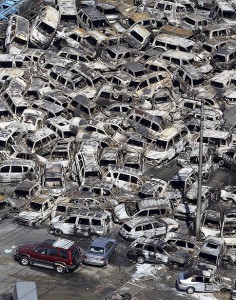Another earthquake in Japan
Yokohama, Japan – Nissan is forecasting a 15.4 percent drop in profit for the fiscal year through March 2012 because of production disruptions from the March earthquake and an unfavorable exchange rate.
But the Japanese automaker is expecting to sell more cars around the world, despite the disaster in northeastern Japan that battered production earlier this year at 4.6 million vehicles, up 9.9 percent on year – underscoring Nissan (NSANY – news – people )’s resilience.
Nissan President and Chief Executive Carlos Ghosn said Thursday that Nissan hopes to boost market share in the U.S. from the current 9 percent to 10 percent, seeing that as “a milestone.” He acknowledged that won’t be reached this fiscal year because of supply shortages caused by the disaster, but Nissan had been almost there when the magnitude 9.0 quake struck on March 11.
He also said that the company’s six-year plan, to be disclosed Monday, will show strong growth for the years ahead, not only in emerging markets but also in developed markets like the U.S. and Europe.
Nissan Motor Co., Japan’s No. 2 automaker after Toyota Motor Corp. (TM – news – people), said Thursday that its profit will drop to 270 billion yen (3.4 billion dollars) for the fiscal year through March 2012 from 319 billion yen the previous fiscal year.
Sales are expected to edge up 7.1 percent to 9.4 trillion yen (117.5 billion dollars).
Nissan Motor Co., Japan’s second – largest automaker, expects full-year profit to fall 15 percent after the nation’s record earthquake disrupted production and sales while the yen strengthened.
Net income may decline to 270 billion yen (3.4 billion dollars) in the 12 months ending March 31 from 319.2 billion yen a year earlier, the Yokohama-based company said in a statement today. The projection is higher than the 237 billion yen average of five analyst estimates compiled by Bloomberg in the past 28 days.
Japanese automakers are boosting production as they recover from the March 11 natural disaster that damaged car factories and parts plants, leading to a 60 percent plunge in domestic vehicle output in April. Nissan expects to resume full production globally by October.
“Nissan can’t expect much profit from Japan because of the quake, or from North America, because the major indicators like GDP and the unemployment rate aren’t very positive” – said Yuuki Sakurai, president at Fukoku Capital Management Inc. in Tokyo. “Nissan should try to expand in China, Russia and other emerging markets.”
Nissan’s global vehicle sales may rise 9.9 percent to 4.6 million this fiscal year – the company said. Revenue may increase to 9.4 trillion yen from 8.77 trillion yen a year earlier.
Tokyo, June 23 – Japan will see mostly average to hotter-than-average weather from July to September – the Japan Meteorological Agency said on Thursday, which could push up air-conditioning usage and exacerbate power supply problems in the wake of the earthquake in March.
Eastern Japan, which is partly served by quake-hit Tokyo Electric Power Co, will have a 40 percent chance of average or higher-than-average temperatures for the period – the weather agency said in its latest three-month forecast, which is issued monthly.
Higher air conditioning usage would increase electricity demand, which could strain the power grid would after the quake and tsunami knocked out nuclear and thermal plants operated by Tokyo Electric and Tohoku Electric Power Co.
The agency upgraded chances for hotter weather in July in western Japan to 50 percent from 40 percent last month, which could adversely affect the tight power supply situation at Kansai Electric Power Co.
Western Japan’s Kansai, which is more heavily reliant on nuclear power than most of Japan’s regional utilities, has asked its customers to cut power use by 15 percent during peak hours this summer to avoid rolling blackouts, with no timetable for the restart of nuclear units amid worries over safety.
